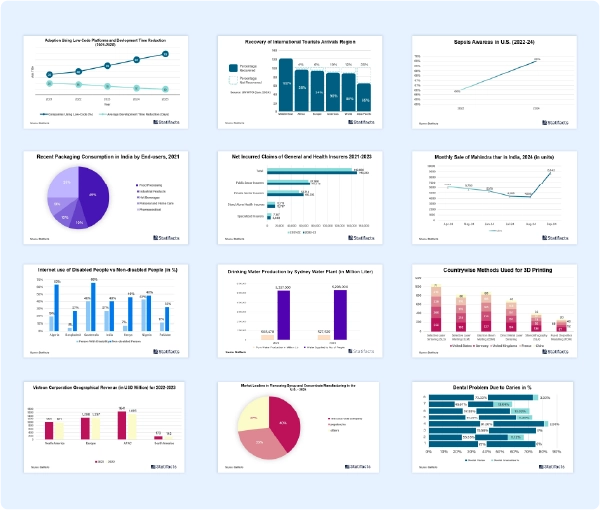The global contract development and manufacturing organization market size surpassed USD 224.88 billion in 2024 and is predicted to reach around USD 8,283.9 billion by 2034, registering a CAGR of 38.8% from 2025 to 2034.
Contract Development and Manufacturing Organization Market Report Highlights
- North America dominated the market in 2024.
- Asia-Pacific is observed to be the fastest growing in the market during the forecast period.
- By service, the CMO segment dominated the market in 2024.
- By service, the CRO segment is observed to be the fastest growing in the market during the forecast period.
Industry Valuation and Growth Rate Projection
| Industry Worth |
Details |
| Market Size in 2025 |
USD 312.13 Billion |
| Market Size by 2034 |
USD 8,283.9 Billion |
| Market Growth Rate from 2025 to 2034 |
CAGR of 38.8% |
A contract development and manufacturing organization market deals with corporations that associate with pharmaceutical firms to offer drug generation and production services on a contractual support. These organizations, often referred to as CDMOs, provide support to companies outsourcing the development and production of drugs and other pharmaceutical therapeutics at a faster and usually subsidized rate. The widespread development of the pharmaceutical and biotechnology sectors, especially in emerging economies, has led to a growing trend of pharmaceutical outsourcing. CDMOs provide multiple advantages to the pharmaceutical firm, like decreased infrastructure expenses, skilled from expertise staff, and the important production ability to raise production.
North America dominates in the contract development and manufacturing organization market due to the great focus on research and development (R&D) and long-established biotechnology and pharmaceutical firms. Rising costs are forcing major pharmaceutical players to outsource many projects to contract manufacturing and development service providers. Contract development and manufacturing organizations work in a number of research areas, including vaccines, specialized therapies, and biologics. It is pushed by growing drug development undertakings, the growing complexity of drug manufacturing, and the advent of personalized medicine. North America has a well-structured framework, regulatory expertise, and a skilled workforce, which create an attractive home for CDMO operations.
Asia Pacific is anticipated to be the fastest growing in the contract development manufacturing organization market because it is mainly observable due to the growing need for healthcare and pharmaceuticals expenses. Countries manufacture drugs at low expense while highlighting research and development activities with their own firms.
The growing need for biosimilars and biologics is another major driver for the contract development and manufacturing organization market biologics, which include monoclonal antibodies, gene therapies, vaccines, and cell-derived therapies, are gaining extensive recognition for their capability to treat chronic and complex diseases like diabetes, autoimmune disorders, and genetic and cancer conditions. These treatments usually need highly customized production procedures, like advanced bioreactor systems, strict sterile production environments, and precision formulation techniques.
As the need for biologics is pursued to expand, pharmaceutical firms tackle challenges associated with the complexity and scale of production. Thus, contract development and manufacturing organizations offer important value, providing the technical expertise, manufacturing flexibility, and specialized infrastructure required to manufacture biologics on a larger scale.
Smaller, essential contract development and manufacturing organizations provide competition to larger, well-known key players that have substantial resources and worldwide reach. This enormous competition places pressure on firms to transform themselves via innovation, expense-effectiveness, and the capability to provide customized services. To manage a competitive margin, CDMOs have to innovate constantly, scaling state-of-the-art production technologies, sustained greater-quality standards, and delivered flexibility, everything while handling expenses pressures.
Artificial intelligence plays a pivotal role in standardizing procedures, driving efficiency, cutting short drug development timelines, and allowing for more careful quality control in the contract development and manufacturing organization market. Machine learning-based algorithms are used to conduct predictive modeling studies, allowing contract development and manufacturing organizations to simulate different formulations and forecast how various excipients, such as bulking agents, interact with active pharmaceutical ingredients (APIs).
This drastically brings down the number of experimental trials required, speeding up the formulation development process substantially. With AI-incorporated systems, procedures become more aligned, from basic materials to final items, reducing manual intervention. Further, its ability to obtain resource allocation, decrease energy usage, and restrict waste leads to eco-friendly production methods. Elements with self-tailoring sensors assist less maintenance demands, leading to a reduced environmental effect, allowing for more precise and accurate results.
Continued biotechnological breakthroughs suggest a promising future for the contract development and manufacturing organization market. Recently developed bioprocessing technologies, like modular production facilities as well as single-use systems, are permitting these organizations to speed up manufacturing with greater flexibility and more efficiently. Continuous producing technologies, which permit the uninterrupted manufacturing of pharmaceuticals, are now obtaining traction in the CDMO field, decreasing production expenses and enhancing product quality.

